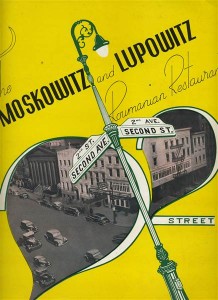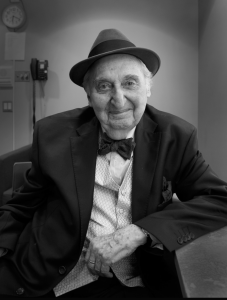For many years that was the motto of Moskowitz & Lupowitz, a Romanian-Jewish restaurant on Second Avenue and Second Street in New York. It was a favorite of Groucho Marx, Milton Berle, Eddie Cantor, Sid Caesar and other theatrical luminaries. It was founded in 1909 by Romanian immigrants and for many years was owned and managed by Louis Anzelowitz until finally closing in 1966. It was one of HG’s favorite New York restaurants, offering a robust array of artery clogging traditional Eastern European Jewish dishes. (The loud Sammy’s Romanian on Chrystie Street is the last of the Romanian Jewish restaurants on the Lower East Side. Its menu is a pale shadow of the wonders once offered by M & L). When HG was a child M & L loomed large in HG’s imagination as he often heard their catchy jingle being sung by the Pincus Sisters on the Yiddish language radio station WEVD (named after socialist Eugene Victor Debs). M & L was the classiest Lower East Side restaurant with waiters in tuxedos and thickly carpeted floors. Despite the elegant atmosphere, it was never very expensive. In 1940 you could have a five course steak dinner for $1.35 (fruit juice, appetizer, soup, main dish, dessert). In 1962 you could have this meal for about $4.50. HG’s cardiologist would not have approved of HG’s typical M & L meal: Brains, sweetbreads, chicken livers or chopped liver with chicken fat and onions as an appetizer. This was followed by chicken soup with “kreplach” (meat filled dumplings). Main course was an M & L specialty: “Mushk” steak (rib steak) with “kasha varnishkes” (buckwheat groats with Farfalle pasta, fried onions and chicken fat.) Dessert was an afterthought: Stewed prunes (for digestive purposes). HG drank vodka with the appetizers, beer with the main course and Slivovitz (plum brandy) as a digestif. Plus Russian tea (strong black tea with a spoonful of cherry jam). HG often went to M & L with a stylish girl friend who ordered four appetizers as a meal (they had to be brought in succession by the waiter who grumbled as he made trips to the kitchen). The lady washed them down with Wild Turkey bourbon on the rocks. Pre-World War Two Lower East Side had many “Romanian broilings” restaurants. When little HG accompanied his father to that neighborhood to buy HG a winter outfit (heavy plaid mackinaw, corduroy knickers, cap with attached earmuffs) the two often would visit these joints to lunch on broiled “karnezelach” (beef, garlic and onion cigar-shaped hamburgers) with crisp “silver dollar” potatoes. At night, these places would transform and often featured a violinist playing Yiddish and Gypsy melodies. Italian mobsters and their Jewish gangland associates loved these rough and ready eateries. They were known as “Jew joints.” The bad guys never patronized Moskowitz & Lupowitx. Too classy. Too bourgeois. A “carpet” joint.
“Where The Finest Jews Eat”
March 1st, 2015 § 2 comments § permalink
The Jewish Waiter R.I.P.
September 25th, 2014 § 2 comments § permalink
The old time New York Jewish waiter has disappeared. Nostalgia, of course, colors many memories of these flat-footed, bad tempered guys. They were not subservient. They did not introduce themselves: “My Name is Moisha. I’ll be your waitperson tonight.” They were not actors, directors, artists. They were career waiters and not happy about it. Most Jewish waiters disapproved of HG. At Gitlitz, located on Broadway and 79th, the best of all delicatessens, HG always ordered a sandwich that HG’s waiter considered an abomination: Pastrami and chopped liver on rye with Russian dressing. “You sure you want Russian dressing?” “Yes.” “Feh!!”, exclaimed the waiter. At the Paramount Dairy on W. 72nd Street HG would order warm gefilte fish in broth and wave away the proffered challah (egg bread). HG would accompany the fish with buttered onion rolls, undisturbed by critical glances. The Jewish waiter attitude was exemplified by a response HG received at Moscowitz and Lupowitz on the Lower East Side. “So, what’s good tonight?”. queried HG. “Whatever we got is too good for you.” The wonderful actor Fyvush Finkel, a stalwart of the Yiddish stage, was a long time customer at Cafe Royal on Second Avenue, the hangout of Yiddish actors, musicians, composers, directors, producers, press agents, playwrights, set designers and others connected with New York’s once vibrant Yiddish theater. Finkel always sat at one waiter’s table. He would watch some beautiful pot roast go by and order it. The waiter would shake his head. “Nem (take) deh chicken.” So, Finkel ate chicken. Went on for years. “Nem deh chicken.” Then Cafe Royal closed before he could taste the pot roast. Asked why he always sat at the waiter’s table, Finkel explained: “I am a masochist.”

